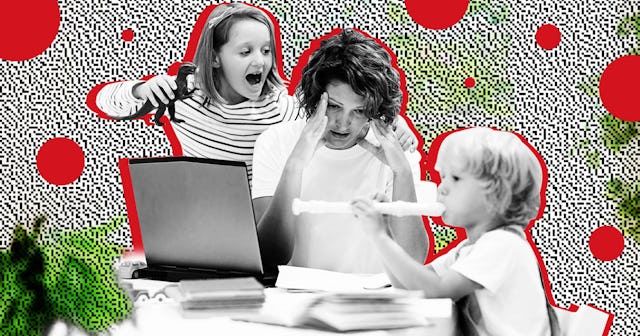You're Not Homeschooling -- You're 'Crisis Schooling'

Normally, I homeschool my children five days a week. They wake up around eight in the morning; we start school around ten. Sometimes my oldest begins reading before that — they love to read. I read with the six-year-old; they do their math. After that, we tackle writing and social studies. Some days, we do science, but they get a lot of that in their everyday lives (my husband is an amateur naturalist), so often, we don’t bother, unless we’re into chemistry or physics. We finish up and eat lunch. Now that we’re in the middle of a COVID-19 pandemic, our days look nothing like this. That’s because we are not homeschooling. We are crisis schooling.
Crisis schooling means something very different than homeschooling. It’s what I’m doing, and it’s what you’re doing, too. We are not teachers. We are a support staff, counselors, cuddlers. My husband (who is a public school teacher) and I decided, at the beginning of this crisis, our children have a lifetime to learn math. In the midst of this, we want them to learn that they are safe, that they are resilient, that they can cope with adversity, that they can draw strength from each other and from their family. In other words: we want our kids to come out of COVID-19 with their mental health intact.
Because we are prioritizing their mental health over their learning, crisis schooling looks very different than homeschooling.
What is crisis schooling?
Basically: we’re in the middle of a pandemic. Our kids are scared. Their main emotions right now are likely fear, boredom, worry, and anxiety. They simply cannot learn when these emotions dominate their psyches. In order to learn well, children need security and safety, and on a higher level, friends.
Our kids don’t have any of those things right now.
Crisis schooling means being flexible enough to prioritize our children’s emotions over their academic learning. So when my kids were scared, we didn’t try to make them read or do math. We put them on the couch with the LEGO Movie. We let them watch Star Wars. We gave them plenty of cuddles and didn’t push reading, writing, or arithmetic. Why? My kids were scared. You can’t learn when you’re scared.
What’s this mean for you?
Fertnig/Getty
Toss the packets.
Well, maybe don’t toss them. But don’t stress about them. Realize that you are not a teacher. Your child is not your student. First and foremost, your are a parent, and your child is your child. This is your primary role, and COVID-19 hasn’t changed that.
As a parent, your main job is to look out for the health and welfare of your children: both physical and psychological, then academic. Your child has to be happy and whole, after which you can worry about schooling. Therefore, in a crisis, your priority is not whether or not they learn fractions or write journal entries. Your priority is that your kids feel safe and secure. So you do what you do when you need to do it. Some days, school will work. Some days, school will half-work. Some days, it won’t work at all, and that’s okay. You need to be okay with that not-okay part. That’s part of crisis schooling.
You are not homeschooling. You did not make a conscious decision to pull your child out of the school system for any number of reasons. You did not choose this. Instead, this was forced upon you because of a pandemic. You are, instead, crisis schooling. Crisis schooling is not a choice. Crisis schooling is a necessity, forced upon you, and you don’t have to like it. Homeschooling parents have made a choice to keep their children home with them, and that is not with this is.
What About You?
Crisis schooling parents? You didn’t pick this. And it’s okay to feel trapped, forced, and frustrated. It’s okay to feel that your free time has been stripped away, that your kids are driving you nuts, that you can’t do your stay-at-home job and teach your kids at the same time.
Even parents who chose homeschooling feel this way, and that’s normal and fine.
Parents forced into crisis schooling are even more apt to feel these things though. Give yourself the space and grace to let those feelings happen. Remember, we can’t control the way we feel. We can only control the way we act on those feelings.
You need to take care of yourself too. You are also in the middle of a crisis. Crisis schooling also applies to the parent. The other day, I got desperately upset. The kids didn’t do school that day, because I was decidedly not all right. And that’s okay. Crisis schooling means giving everyone, including you, space to prioritize your mental health. When we care for ourselves, it is wholly beneficial to our children as well. We must remember that.
We are involved in something unprecedented. We are involved in something unheard-of, something world-changing. You cannot expect that things will go on as normal. You cannot expect that everyone will go through this without their share of crying jags, of breakdowns. This is normal. This is healthy. And this is why you’re crisis schooling. It isn’t the same as everyday homeschooling.
They say “may you live in interesting times.” A blessing? A curse? A pronouncement, certainly, and one for these days. Things don’t go on normally in interesting times.
That includes school. So, give yourselves (and your kids, and their teachers) a break.
This article was originally published on